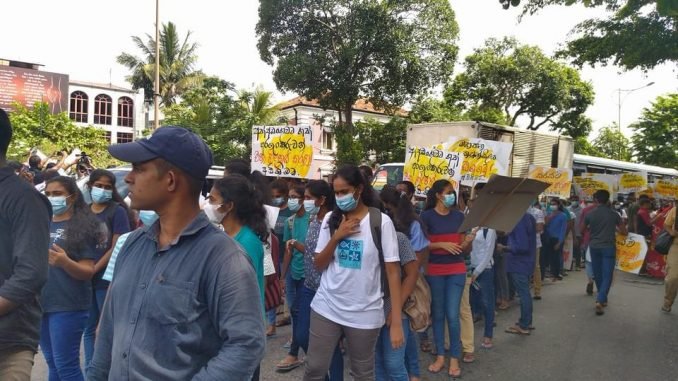
Prasad Welikumbura, United Socialist Party (CWI in Sri Lanka)
On the 18th of August the newly appointed president of Sri Lanka unleashed a brutal attack on a demonstration in Colombo organised by the Inter-University Students Federation (IUSF). The IUSF played a key role during #GotaGoGama (Occupy Galle Face) movement that played an important part in building the mass upsurge that forced former president Gotabhaya Rajapakse to resign. They were the largest organized group at the GotaGoGama permanent protest site in Galle Face Green in Colombo.
During the August 18 protest peaceful student activists called for the abolishment of the Executive Presidency, introduction of a new Constitution, release of all detained protestors, provision of relief measures to the people, establishment of Peoples’ Councils and for the Sri Lankan government to commence academic activities in schools and universities that have been closed for the past three years.
The march started from the Lipton roundabout and was planned to go to the Fort Railway Station. The government deployed more than 500 riot police, police and the Police Special Task Force (a paramilitary group attached to the police) against unarmed, peaceful student protestors. The attack was started just after students had begun their match and the police using water cannon and tear gas chased away the students from Union Place – down Ward Place – Borella junction – Borella Cemetery junction and then Narahenpita.
During the attack they made a total of 20 arrests, including the arrest of IUSF Convenor, Wasantha Mudalige, and a civil society activist, Chintaka Rajapaksa. Some students & activists were brutally assaulted by the police at the point of arrest. Two student monks were missing for 3-4 hours from the time of their arrest. Police deliberately hid their whereabouts by giving lawyers false information, when they visited the stations where the monks were held. It took hours for lawyers to finally trace all 20 who were arrested.
At the time of the arrest, police were unable to provide a proper reason why they were arresting people. Police unlawfully denied these students from exercising their democratic right to protest.
16 student activists were released on bail by the Aluthkade Magistrate on the next day. But the activist Chintaka Rajapaksa was remanded till the 26th of August. IUSF Convenor, Wasantha Mudalige, Convenor of Inter-University Bhikshu (Buddhist monks) Antharey, Galwewa Siridhamma, and IUSF member Hashan Jeevantha were detained under the Prevention of Terrorism Act (PTA) for 72 hours. Then, on the 21st of August, president Ranil Wickramasinghe signed detention orders to keep them imprisoned without charge for 90 days while they are investigated to see if they were part of any “anti-state conspiracies” and were linked to an “act of terrorism.” Furthermore they were transferred to a prison in the Tangalle area, nearly 200 kilometres away from Colombo, so it would be hard for any of the lawyers to provide them with necessary legal support.
This is not the first time the government used unjustifiable force against peaceful protesters. They have been practicing this tactic for a long time. As soon as the current president Ranil Wickramasinghe was appointed to office he ordered, on 22nd of July, the military to carry out a brutal attack on #GotaGoGama base at Galle Face Green. During that attack not only protesters but also international and local journalists, along with some bystanders, were detained, assaulted and even tortured by the military. From that date onwards he has been continually trying to crack down on the mass movement using the full force of the government.
As a response, the IUSF published an open statement and petition asking the public and organizations to condemn the state’s oppression. They also published a full report on the government’s attempts to disband the #Aragalaya (Struggle, the broad grouping that helped initiate the movement) by assaulting them.
The United Socialist Party (USP, the CWI in Sri Lanka) condemned these latest arrests and demanded the immediate release of all protestors and political oppositionists those detained in recent weeks along with the abolishment of the PTA.
Alongside the battle to defend the right to protest there are the immediate struggles to protect living standards as the government makes renewed attempts to make the mass of the population pay the price for the economic collapse caused by the combination of policies of the Rajapakse regime and world economic crisis. This includes resisting wider attacks like the government push for further privatisation.
The mass movement starting in March that ousted the Rajapakse clique in July showed both the anger in society and the tremendous strength of the mass movement. The USP supports the ongoing attempts to organise the movement by building democratically elected people assemblies in all parts of the country. These can play an important part in a drive to organise a general strike that relaunches the protest movement against the attempt by the ruling class to restore its full control. Within such bodies and movements the USP argues for a workers’ led government that can, on the basis of nationalisation of the commanding heights of the economy, begin to democratically plan the use of the country’s resources the country to meet the needs of the masses.
